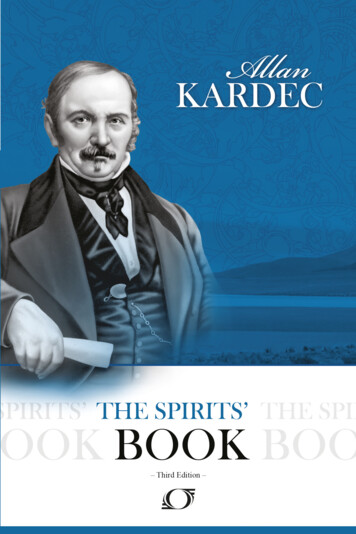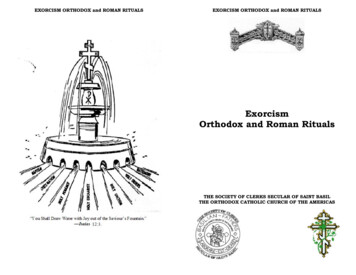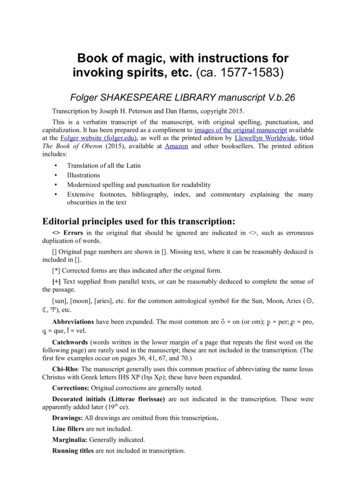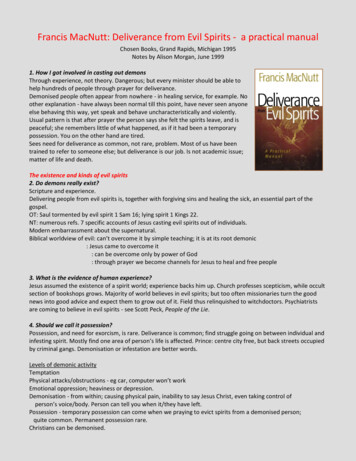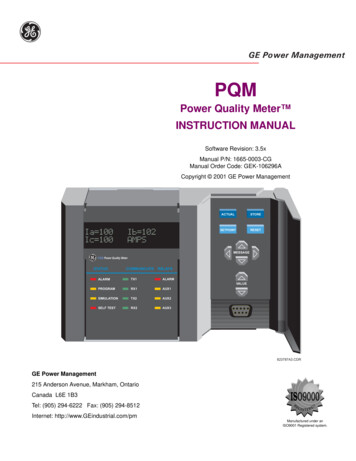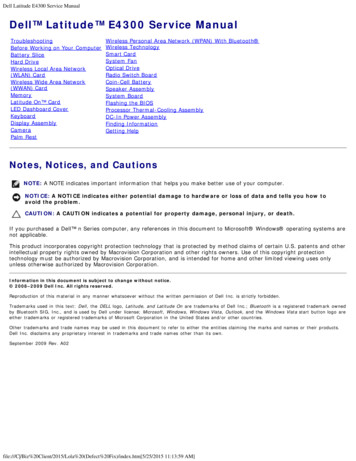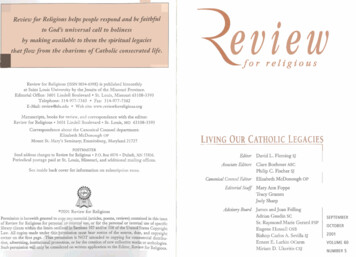
Transcription
Review for Religious helps people respond and be faithjklto God's universal call to holinessby making available to them the spiril tallegaciesthat flow from the charisms of Catholic consecrated life.Ievzew8for r e l i g i o u sReview for Religious (ISSN 0034-639X) is published bimonthlyat Saint Louis University by the Jesuits of the Missouri Province.Editorial Office: 3601 Lindell Boulevard St. Louis, Missouri 63 108-3393Telephone: 314-977-7363Fax: 314-977-7362E-Mail: review@slu.edu Web site: www.reviewforreligious.orgManuscripts, books for review, and correspondence with the editor:Review for Religious 3601 Lindell Boulevard. St. Louis, MO 63108-3393Correspondence about the Canonical Counsel department:Elizabeth McDonough OPMount St. Mary's Seminary; Emmirsburg, Maryland 21727.POSTMASTERSend address changes to Review for Religious P.O.Box 6070 Duluth, MN 55806.Periodical postage paid at St. Louis, Missouri, and additional mailing offices.LIVING OUR CATHOLICLEGACIESsEditm David L. Fleming SJAssociate EditorsSee inside back cover for information on subscription rates.Clare Boehmer ASCPhilip C. Fischer SJCasonical CozcnseI Editor Elizabeth McDonough OPEditorial St@I1Mary Ann FoppeTracy GrammJudy Sharp82001 Review for ReligiousPermission is herewith granted to cop? anymate,daL(artides, poems, revi.w),containedin this issueGt for the p.ersobsl:or internal use of specificof Review for Religious for personal of@tffiia!*,.library clients within the limits oudIned jn1ti7 pa ior'i68ofthe UnitedStates CopyrightLaw. All ropiqmade und :@a @kiom aurrt kof the son*dste, and copyrightowner on the fist page. 'TbapamissM is NOT extaLded to FoWing for mmnCrcia1 distribution, adverdsing, i n @ h d p r d o o , or for the m?dnofnm collective work or anthologies.Such pqmjssiob td a n l be consided on nrittentteapp i ati nto the Editor a-dsw for Religious,Advisoy Board James and Joan FellingAdrian Gaudin SCSr. Raymond Marie Gerard ESPEugene Hensell OSBRishopCarlos A. Sevilla SJErnest E. Larkin OCarmMiriam D. Ukeritis CSJSEPTEMBEROCTOBER2001VOLUME 60NUMBER 5
JANET K. RUFFINGExercising Power andDiscerning Spiritsa discerningwayA critical relationshio to our exercise of power is aspiritual task for all Christians. This is true, then, forall the sisters who participate in congregational assemblies or chapters, and not just for those elected to leadership. There are many sources of power: wealth,education, ethnic origin, family stam, professional role,elective and appointive offices, reputation, organizational sbill, control of information, and personal gifts.In a number of situations, we fail to take into consideration the presence of these various powen among us.As Christians we are responsible for o w exercise ofpower on behalf of the human community and of individual persons within o w spheres of power. We arecalled to live o w lives in the service of the kingdom ofGod and the values of the gospel regardless of our particular settings and regardless of how others may exercise power around us. Choices about our exercise ofpower may be difficult if we have not had helpful rolemodels. Nevertheless, it is through the critical exerciseof power that we inhabit more fully our humanity,empower others, respond to the power of Jesus' spirit-Janet K. Ruffing RSM,professor of spiritualityin Fordham'sGraduate School of Rehgion and Religious Education, lastwrote for us in July-August 1997. Her address remainsGSRRE, Fordham University; 441 East Fordham Road;Bronx, New York 10458.within the community, and effect change in the world. Ourresponse to God's Spirit in us is such an exercise of power.The New Testament speaks about a kind of power that is basedneither on domination nor position. It is the power that comesfrom on high over Mary: the Holy Spirit, who effects her conception of Jesus and who comes upon the community gathered inhis name after the resurrection. Jesus' ministry is characterized bya release of God's power as heexpels demons and heals thosewho believe. The woman withthe issue of blood touches Jesus,Relihuscommunities"and power goes out from him.are meant be placesIn Luke,all try to touch Jesus inorder to be healed becausewherethis power ofpower emanates from him.When Jesus sends out his disciGod's Spirit is Wlanifest, inples to preach, he confers powerconcrete and particular Ways.on them, not to rule but to healand to cast out demons. Jesusbrings into our midst freedomfrom all that binds us. He healsand forgives sin, and through the Spirit he shares this power forgood with us. We share in this healing and reconciling power. TheSpirit is poured forth on the entire gathered community after theresurrection, and o w gathered communities continue to share inthat outpouring.We, as apostolic women, are empowered by that same Spirit.We are called to develop ways of making decisions, organizing ourlives, and harmonizing our gifts so that this holy power is releasedin each of us and in the group as a whole for mission. The disciples had trouble understanding this, too, for they kept mixing upthese two kinds of power-wanting to rule and lord it over othersrather than releasing the God life to its own ends.Religious communities are meant to be places where thispower of God's Spirit is manifest in concrete and particular ways.It is part of our witness to the world. Many of us have workedlong and hard to change the way we relate to one another throughour shared exercise of power so that the life of God filling us withdesire might be released in God's people. In Sbc Who is, ElizabethJohnson describes what the experience of the Spirit is like at thelevel of institutions:
R e gErmtiin Power and DircemfnR SpiritsOn the level of the macro systems that structure humanbeings as groups, profoutidly affecting consciousness andpatterns of relationship, enperience of the Spirit is also mediated. Whenever a human community resists its own desuucdon or works for its own renewal; when shucturd changeserves the liberation of oppressed peoples; when law subverts sexism, racism, poverty, and militarism; when swordsare beaten into ploughshares or bombs into food for thestarving; when the sores of old injustices are healed; whenenemies are reconciled once violence and domination haveceased; whenever the lies and the raping and the killiug stop;wherever diversity is sustained in koinrmia; wherever justiceand peace and freedom pin a transformative footholdthere the living presence of powerful blessing mystery amidthe brokenness of the world is mediated. And it is knownnot in the open, so to speak, but as the ground of the praxisof freedom that survives and sometimes even prevails againstmassive violence; as the qound, in Peter Hodgson's tellingwords, of those partial, fragmentary, disconnected, transient,tiny, yet transforming rebirths that enable history to go onat all in the midst of vast discondnuities and meaninglessness.So universal in scope is the compassionate, liberatingpower of Spirit, so broad the outreach of what Scripturecalls the finger of God and early Christian theologians callthe hand of God, that there is v i d y no nook or cranny ofreality potendally untouched. The Spirit's presence throughthe praxis of freedom is mediated amid profound ambiguity, often apprehended more in darkness than in light. It isthwarted and violated by human antagonism and systems ofcollective evil. Still, "Everywhere that life bre& forth andcomes into being, everywhere that new life as it were seethesand bubbles, and even, in the form of hope, everywhere thatlife is violently devastated, throttled, gagged, and slainwherever true life exists, there the Spirit of God is at work."This is not to say that every person who reflects on the worldwould arrive at this same conclusion. But, within the Jewishand Christian faith, the Spirit's saving presence in the conflictual world is recognized to be everywhere, somehow,always drawing near and passing by, shaping fresh starts ofvitality and freed0m.lWe are often privileged to wimess the vitality of freedom in.these fresh starts and often fragmentary rebirths around us. Yet, Ibelieve, all of us still have much to learn about our exercise ofpower. This task requires us to be attentive to both subtle andprofound movements of the Spirit of God in our midst and attentive to our need for ongoing conversion in our use of power per-sonally and communally. Where God's Spirit is authentically atwork, individuals experience an increase in energy, creativity, andhumanization.Challenge and ConflictBecause we live in times of unprecedented cultural change,leadership in women's communities is increasingly charged withtasks of "nonroutine" or adaptive work, to use the vocabulary ofRon Heifetz. Leadership in such times is charged not only withroutine administration, but also with guiding a communitythrough adaptive challenges. Wehave commonlv used the vocabulary of uansfo&ational leadershipfor this function. Adaptive o rtransformational change requiresrkkchanges in values, beliefs, andbehaviors. It requires much moreof both leaders and members thansimple modification; it will notoccur unless leaders identify conisto- J-- -flict and work with it rather thanavoid it. Groups themselves rarely,if ever, correctly identify the deepoflevel challenges to which thev needto respond. T h e work is simply toohard, and the ordinary membersare frequently lacking the "big picture" or the specific information that would impel them to initiate change. Members areusually so thoroughly immersed in their own ministries that theseeclipse the bigger picture even if they have access to it.Leaders often work withbigger pichlre every day. Thisis one reason why leaders have a responsibility to share information and to articulate their perceptions to the group engagedin deep change. For communities to flourish a t the present time,they need skillful administrators who effectively direct the technical or routine details of the group's life and mission, and theyneed leaders who can distinguish among these tasks while attendi n g to the transformational change process and orchestrating i cChange at this level can result only from a collective and contemplative process.Religious communitiesare now atof slow exfincfioniftheir leadersthinktheir onlu taskimplement the co?Eensualdecisions the goup. -
Ruffinp.Ejcercisine Power and Discerninc SoidsReligious communities are now at risk of slow extinction iftheir leaders think their only task is to implement the consensual decisions of the group. Although this function is necessary,the process is slow and cannot keep up with the pace of change.Leaders need to anticipate and help the group keep movingtoward the next change. Yes, women leaders do tend to use theircollaborative skills to achieve consensus instead of imposing theirsolutions on the group, but a group can come to consensus ononly so many issues, values, decisions. T h e energy and skill usedin developing consensus, if not focused on really importantchoices, may drain energy from hard adaptive work that remainsto be done. In religious life today, leaders often need to initiatechange by correctly identifying unavoidable challenges andhelping the group see that some of these challenges must beresolved by a deep level of change, and not merely by technicalsolutions or skill. For this task, leaders need all of their motivational skills to keep the group engaged in the process, and theyneed to create a safe enough space for fearful and distressedmembers to do what they would just as soon avoid doing.Tranformational change is the occasion for a considerableamount of distress. Leaders need to anticipate this distress,which often manifests itself as resistance, and endeavor to alleviate enough of it so the group can do the work required. Eromleaders this requires all of the qualities the FORUS study in theearly 1990s identified in authentically spiritual leaders. Leadersmust demonstrate, on the one hand, a radical and genuine trustin God and in the future into which God invites us and, on theother hand, must not minimize the distress in the group. Leadersneed to absorb a great deal of the distress and not pass it on, butalso to get the group to confront the change. This graced ability to remain unflappable under pressure is difficult. Leadersneed to have acquired considerable spiritual, psychological, andemotional resources to do this without damage to themselves.Leaders need not convince members to resolve challengesexactly as they would prefer. What they must do is continuegiving the task of finding creative solutions back to the groupor to one or more committees if that seems more practical.Effective responses can and do emerge out of careful handlingof conflicting- points of view. Frequently the resolution is notgoing to be what the leaders envisioned. This is why nominees,when asked what they would do in a particular situation, canArarely answer convincingly. They simply do not know what theemerging issues are or will be. Only as new issues arise can leadership identify them and focus attention on them. To ignorethese late-rising issues would be to ignore the rest of the workto be done. Leadership serves the group by continually trying tothink ahead of i t and be ready to help the group respond toemerging issues.For the prophetic or dissenting voices to have any impact inthe group at all, leaders will need to make room for both thenovel and the differing until they get enough hearing to enablethe group to shift. Whenever the novel emerges, the group needstime to welcome the possibilities it offers and to negotiate themany subtle interior shifts that such a change might require. I t isdifficult for people to receive the novel if its herald is not oneof the more acceptable and respected members of the group. Yetthe proposed newness may be exactly what is needed. This deeperlevel of change can never happen in a group unless the positionalleaders, the women elected to leadership and bearing the right toexercise authorityin the name of the group, use that power skillfully until the tensions can be resolved?Some of the studies on women in leadership show thatwomen leaders tend to rely more on their personal power thanon their official authority If those of you who are leaders in aspecific situation are wondering if you have authority or not, i tmay be because you are not making enough use of i t as youinvite, cajole, encourage, inspire, and entice the group to dowhat it needs to do. Some of you may avoid using your positional authority in order not to evoke old transferences t oauthority. Women leaders and their communities need to seeauthority as a resource to be used for the sake of the group.Most members want to be challenged to be their best selves,even though everyone is aware that conversion and growthcannot be coerced.I n facing the particular challenges of transformationalchange, we as women let our historical wounds regardingauthority heal. We develop the skills of being leaders and members in partnership, in mutuality. We focus our energies inharmony with the divine energies for the sake of mission. I wantnow to reflect more a t length on the exercise of power in adiscernment mode-in the context of choosing leaders and gathering together in assembly or chapter.
RufinpE r d n Power and discern in SpiritsDiscernment of SpiritsMy reflections draw on some themes from Catherine of Siena'steaching on discernment of spirits and also on the skills andwisdom of the Quaker tradition of communal discernment.Although Catherine of Siena does reflect incidentally onvarious interior movements in the course of her Dialogue, sheemphasizes discernment. For her, discernment has more to dowith right relationships and living in harmony with God, whom sheoften calls Truth. Because discernment is rooted in supreme Tmth,"it rightly sets conditions and priorities of love where otherpeople are concerned. The light of discernment, which is born ofcharity, gives order to your love for your neighbors. . . . The priorities set by holy discernment direct all the soul's powers toDiscernment isserving Me courageously and con cientiously." born of charity. This implies that an open, unselfish, loving heartfosters discernment by the ordering activity of love. Discernmentis a virtue that puts everything in perspective and shows us what weowe to each person and situation. Catherine insists it grows anddevelops as we do in the life of God; it enlarges our capacity forlove expressed in ministry. As we grow in our love for God, so dowe grow in o w discernment. Catherine has three stages to thespiritual life, to growth in charity, and to discernment which shecalls the first, second, and third lights.Discernment is the light which dissolves all darkness, dissipates ignorance, and seasons every vime and wtuous deed.It has a prudence that cannot he deceived, a strength that 1sinvincible, a constancy right up to the end, readung as itdoes mm heaven to earth, that is, kom the knowledge of Meto the knowledge of oneself, from love ofMe to love of one'sneighbors. By this glorious light the soul sees and rightlydespite her own weahess?There are, I believe, several implications that we might drawfrom this teaching. As a community gathers for decision making ina discernment mode, no two people in the group are able toparticipate in exactly the same way. As we assemble, we are all indifferent places. The more each of us knows and loves God, themore we understand ourselves. The more we know and love o wneighbors, the more we love God. Catherine recognizes that discernment as a virtue grows and develops over the course of ourgraced history and in proportion to the intensity of our love forGod and for others. This growth reveals to us our particular weak f o r 1 W i e k unesses, blind spots, cowardice, and resistances and our reactionsunder stressall of which, sowing confusion and doubt, may keepus from making costly decisions.This self-knowledge is extremely important. If we do not knowour characteristic ways of responding to stress or distress, ourblindness may increase the confusion and doubt of the gatheredcommunity. Some members may be skilled in this discernment,and others, for various reasons, may nothave the same clear perception of asituation or the same capacity to acceptI f we do not knowGod's invitation to move forward. Thisincapacity may come from current cirour characteristic wayscumstances: a recent bereavement, physical illness, or recent ministry challengesof responding. tothat have left them benumbed.stress or distress,T h e best preparationbefore we. .gather for communal discernment is toblindneSS mayincrease our prayer, to seek self-knowlincrease the confusionedge in the present moment, and to healand reconcile anything we can with otherand doubt of themembers. Intensifying our connection toGod, gaining self-knowledge, and reconcommunity.ciliation efforts can remove potentialblocks within the group. If any memberspeaks the uuth about an issue, situation,or challenge that the group needs to face, every other membermust receive it and 'test" its possibilities for herself and for thegroup. If this truth is spoken by a member whose opinions peoplefrequently perceive to be "off the mark" or whom they tend todismiss because of past performance, the others may fail to respondwith openness to conversion, that is, with willingness to changetheir minds. Individuals and the group need to allow enough timefor such a potential shift to occur among themselves. This is aquite different process from the response those readily receivewho-by reason of their education, their election, or theirprevious performance--are customarily taken seriously.In Catherine of Siena's system, those who practice discernment according to the third "light" are those who have "clothed"themselves in God's will. They are attuned to God and God'sdesire. This harmony with God's will is not necessarily aboutspecific issues; it is a matter of practical insight into the MysterySqMkr-amkrZWI
RflngExercising Pmuer and Discerning Spiritrof Jesus' total self-giving love for us in the paschal mystery. Thetouchstone is not seeing a smgle issue clearly, but living constantlywithin the Christ mystery. Such "seeing" elicits desire to imitateJesus' self-giving love without counting the cost to self. InCatherine's words, such a person "loves me sincerely without anyother concern than the glory and praise of my name. She does notserve me for her own pleasure, or her neighbors for her own profit,but only for love." Such persons are alive with the charism of theircommunity. Full of apostolic zeal, they basically love in un-selfserving ways. Such persons are not prevented from choosing God'swill because of their own selfishness, nor does suffering or anticipated difficulty prevent them horn choosing what is best for God,others, and self.What is sought is God's will, which Catherine assumes leadsus to what is best for everyone. Communities today face manypressing issues. What is best for one community may not be bestfor another. What God may be calling one community to at aparacular juncture is not the same as another. With who we are,where we are geographically, and where we are in our communaland personal histories, what IS best for our mission, our selves,and those with whom we minister?From the rich Quaker tradition of discernment, I will discussonly three themes: unity, peace, and clarity. Quakers, like otherChristians, draw on the "fruits of the spirit" as sketched by Paul inGalatians S:23 as a touchstone for discernment. "The fruit of theSpirit is love, joy, peace, patient endurance, kindness, generosity,trust, gentleness, and self-control." This cluster of outcomes orfruits resulting from behaviors, attitudes, spiritual practices, andinteractions with others reveals lives authentically lived in theSpirit.These fruits are all interrelated. For the Society of Friends,privileged unity in God's love was an important result in community life of various impulses or "leadingsn of the Spirit inindividuals. At certain times of corporate 'waiting on the Lord,"they experienced their unity, their being gathered in God, as apalpable mystical experience. This unity bore fixit in love of neighbor. For them kindness and gentleness were dimensions of thefruit of love. Traditionally they came to ask whether a particularcourse of "action would r o d u c emore or less love., neater or lessulity, more or less joy."lThey valued Tmth as well, assuming that, once the community-was deeply "gathered in unity," an individual under divine guidancewould be consistent with the perceptions of others who were alsoattuned to divine guidance. So the quality of love which couldgather the community in unity also led to discerning the truth.As Patricia Loring describes it, the unity sought is not simpleagreement, not consensus, compromise, or an irreducibleminimum of views. What is sought is a sense of deep interior unitywhich would be a sign that the members are consciously gatheredtogether in God and may therefore trust their corporate guidance:The felt gathering in God tends to illuminate and clarifymotives, to dissolve or harmonize differences-or allow themto stand side by side in the tenderness accompanying gathering in the spirit of God. Unity may enable a way forwardto be found even if members continue to hold differing views.Divisiveness, dismption, or simple lack of unity indicate thatone, all, or some members of the group are not fully underg idance. Peace is yet another important touchstone of the gatheredcommunity. T h e unity of the gathered community brings aboutpeace by harmonizing disparate elements within the communityand within the self. Quakers discovered that 'the recouciliationof disparate parts of one's self or of one's experience in a new,sometimes unexpected direction or action can issue in a deepinterior sense of peace. . . Living dose to the Spirit has the effectof such harmonizing and reconciling both within and betweenpersons." For Quakers, peace as a touchstone in communaldiscernment is "the feeling of being at peace with a decision oran outcome, even if it is not what one sought or hoped for, evenif it calls for considerable hardship or change.'"Often a new burden or task disturbs one's peace initially. Peaceor ease is restored only when one accepts the burden or fulfillsthe task. In leadership selection processes, frequently those beingconsidered experience considerable lack of peace. Sometimes, whena nominee is graced to accept a potential call to leadership, a floodof peace results. When or if this deep peace makes itself felt, aleader may confidently trust the election and will often return tothis initial grace of leadership in difficult times. Lack of peace is asimportant as peace. When peace is disturbed, some action is calledfor. Sometimes the action or resolution is neither simple norobvious. At times individuals and groups suffer a prolonged periodof living with disquiet before the fitting response becomes clear.
R@ng&mising Pourer mui Discerning SpiritsQuakers often used the word "clearn as in "getting clear" todescribe an outcome of discernment. Sometimes it had the connotation of being released from a burden. At other times it involvedacting on a "leading" (that is, a matter discerned) and faithfullycarrying it out. In this early form, getting clear was closer to howwe might describe feeling free. Quakers now use the term clarityor clearness in the sense of coming to intellectual clarity aboutwhat they are to do or what a "leading" might be about, and muchof their individual discernment is aided by convoking a clearnesscommittee. The members of such a group are invited on the basisof their spiritual sensitivity and typically only ask questions whichmight help the individual discerners clarify their inner truth. Theyhelp them darify their situation, motives, and "leadingsn: they donot offer advice.As Patricia Loring describes such a gathering, it first of allopens itself to divine guidance. For Quakers this is not a perfunctory moment of silence, but a much deeper recollection: "foran intentional return to the Center, to give over one's own firmviews, to place the outcome in the hands of God, to ask for a mindand heart as vuly sensitive to accepting of nuanced intimations ofGod's will as of overwhelming evidences of it.n8 This is anattitude of receptivity to subtle hints of God's will as well as tounmistakable darity.Discernment is, then, a habit of the heart. From my perspective it is intimately linked with our spiritual development. Whenwe exercise power in any context, but especially when it is timefor major decision making in community or when we are in 0%cia1 positions of authority, we need discernment to enswe that weare exercising our power in service of the reign of God and not forself-serving benefits of any idnd. When we or o w communitiesare thus "gatheredn in God, an incredible amount of energy 1sreleased for the sake of others and of ourselves. When we enterinto this discernment in parmership with God, whose Spir timpelsus toward goodness, toward love, toward peace, and towardpatience, the results are energy, enthusiasm, gentleness, and joy.NotesElizabeth Johnson, She Wbo Lr (New York Crossroad PublishingCompany, 1993), pp. 126-127.Katherine Clarke, "Leadership When It's Time for Adaptation,"Human Development 18 (Fall 1997): 5-11.3 Catherine of Sienn: The Dialogue, ed. and uans. Suzanne NoMre(Mahwah: Paulist Press, 1980), 11, p. 44. Dialogue, 11, p. 44.Patricia Loring, Spiritual Discernment: The Context and Goal ofClearnesr C m i t t e e s , Pendle Hill Pamphlet 305 (Wallingford, Penn.:Pendle Hill Publications, 1992), p. 7.Loring, p. 8.Loring, p. 9.Loring, p. 24.The WomanAN&,TanzaniaSo short the bridge on the main roadin the cityfew notice the deep stream,nor see,among the bustling feet,a woman, in rags, on the dusty pavement,leaning against the stone parapet,clutching a begging cup.One sprawling leg wears a tattered shoe,the other a soiled bandagelying l o o l whereya f w t should be.I walkgrimly on, and on, and on.Troubled,I turn,walk back two blocksand share my consciencewith a leper.Hugh Sharpe mc
a discerning way JANET K. RUFFING Exercising Power and Discerning Spirits A - critical relationshio to our exercise of power is a spiritual task for all Christians. This is true, then, for all the sisters who participate in congregational assem- blies or


